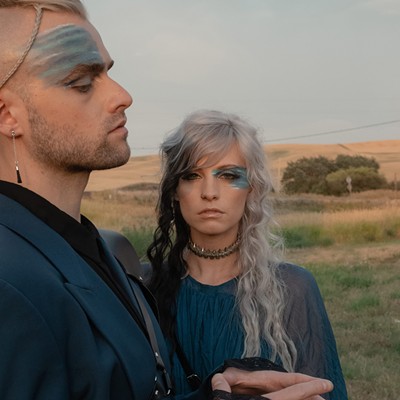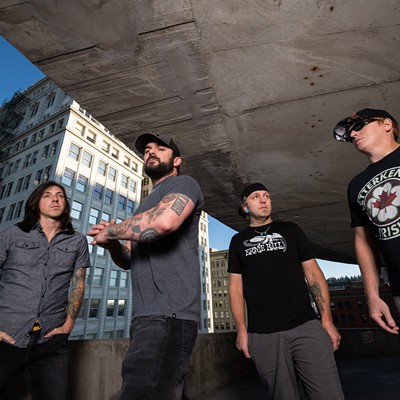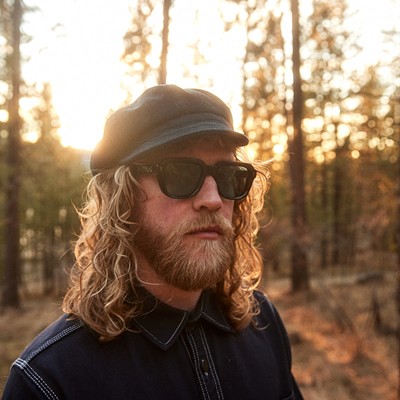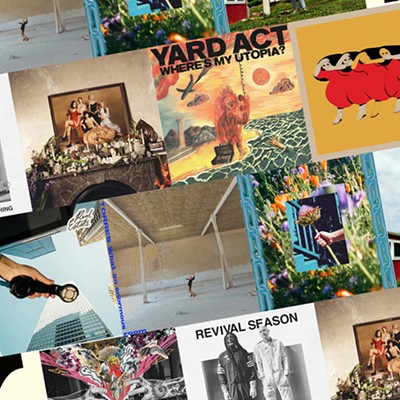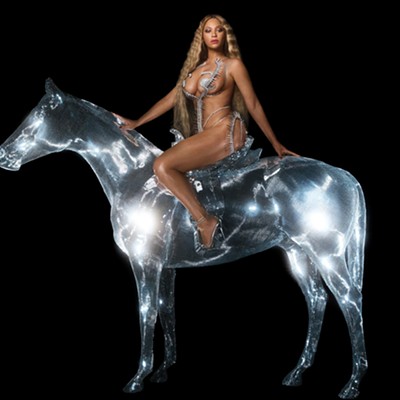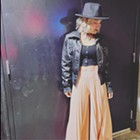“Spokane’s support for live music seems to rise and fall like a gut-ripping roller-coaster ride. Over the course of the last 10 years, this scene has experienced signifi cant bursts in vitality followed by periods of confounding lethargy. So it goes. So often it seems, just as things start to catch fire, an important club will shut down or a popular band will leave town (or break up), and nightlife watchers are left to sign a collective ‘Oh God, here we go again.’” Mike Corrigan wrote that. He was the music guy here at The Inlander through most of the ’90s and 2000s — and he wrote that gem of wisdom in the Nov. 16, 2000, issue of the paper. Ten years ago. It still applies today — in fact, I swear I heard someone say something just like it last week.
Spokane has always, and likely will always, be down on itself. But you’ve got to give us a little credit: A lot has happened to lil ol’ Spokane’s music scene in the past decade. Faces have changed. Venues have shut down, swapped names and been set on fi re. The old guard has been replaced by a shiny, new crop of kids with guitars and mics and rock ‘n’ roll dreams.
So, for all of you local music geeks out there: I give you a few ways our scene became a little more shapely, a little more serious and a little bit frustrating in the last 10 years.
R.I.P.: The Eighth Most Powerful Man in Rock ‘n’ Roll
That’s what Terry Grob liked to call himself. Or maybe someone else named him that. Either way, when Grob left Spokane for the greener pastures of Portland, most Spokane musicians knew the local music scene would never be the same. Many still argue that he was the one that put Spokane on the map, booking local bands with touring acts like Mudhoney and Treepeople through the ’90s at the Big Dipper and Ichabod’s North.
For one reason or another, he left the Lilac City for the Rose City. And while that was still just a tiny tear in the corner of our music scene’s eye, Grob died suddenly from a massive seizure in 2000.
Kelly Gately of Fireballs of Freedom, a Portland band that played more than a few Grob shows here in the ‘Kan, eulogized him in a September 2000 issue of Willamette Week:
“Terry
was rock and roll. In propelling the careers of many Spokane-area
bands, he always gave the underdogs their day in the sun. He was the
only promoter we ever met who cared more about the bands and their
music than lining his own pockets. Terry never kissed your ass or took
any shit. If your band sucked that night, he’d tell you, but he’d
always give you another chance, and let you stay and party in his dinky
apartment while he sat alone in his room playing video chess. He just
wanted his bands to be happy…
I’ll never forget a freezing night in Spokane about four years ago when a bartender at Ichabod’s North denied a young bunch of Missoula hooligans their third ‘band’ pitcher of beer. When Terry caught wind of the travesty, he whipped an empty pitcher against the wall and shouted, ‘If these guys don’t get more beer, I’ll never book a show here ever again.’ He crossed his arms, scratching his chin in trademark Terry fashion, and smiled at us. We got our beer and Terry received a hell of a show. I’ll never see anything like that again, because I’ll never see Terry again.”
There’d be a lull before anyone in Spokane would pick up the torch and start booking like Grob once did. In the mid-2000s, a Northside kid named Patrick Kendrick would come back home to Spokane and start booking shows at a new downtown coffee shop — which would soon evolve into Platform Booking. Others followed suit: The Production Company, ERC Booking, Monumental Booking and kids like Spokane DIY. And many Spokane scene vets would say that all of them have Grob to thank for paving the way.
Shut Up About Expo
When almost all we had to put our little town on the map were railroad tycoons, a serial killer and Expo ’74, one band got out and gave our scene a little street cred. The Makers were a Spokane standard on local punk stages since the early ’90s. But in 2000, Sub Pop Records noticed. The Seattle label, known for fl inging Nirvana and Soundgarden toward fame, released The Makers’ label debut, Rock Star God, an album that garnered nearly perfect reviews from Rolling Stone magazine, among others.
And when The Makers were getting huge, a kid who went by DJ Brainchild on the weekends was slogging through a degree at Whitworth. That kid would, by the mid-2000s, become James Pants — a bizarro hip-hop geek who would get eyes turning toward our city in 2008 with the release of his major label debut, Welcome. That record would send Pants on multiple national and international tours and land he and his band (made up of musicians from Groove Patrol and Belt of Vapor) a spot on the 2009 Sasquatch Stage. Another band, Hockey, a dance-pop outfi t from California, would settle here for about a year to hone their sound before hitting the road for major label success.
And then there’s Kaylee Cole, a young Westside gal who did a stint at Gonzaga, only to discover that she could sing and play piano in a way that could turn audiences to teary balls of mush. She cut one record, We’re Still Here Missing You, which gained her huge regional attention and, by this past summer, a record deal with Chrysalis.
And though they couldn’t be more different — garage rock, spacey hip-hop and girly piano tunes — they got (and are still getting) the word out there to Portland, Seattle, L.A. and everywhere else that yes, Spokane may be weird, but it’s incubating some damn fine musicians, too.
Burning Down the House
Perhaps the most extreme case in Spokane’s venue loss in the past decade was the fiery demise of Ichabod’s North in 2002 — a popular music venue through the previous two decades. Venues blinking in and out is nothing new to our scene, but this decade seemed to be heavy on the closures and light on the open-ers. Fat Tuesday’s closure in 2007 was a big one: shuttering the only mid-sized music venue in town for good — leaving a void that’s yet to be filled. The Big Dipper stopped offering shows almost completely, except on a contract basis. Outback Jack’s shut its doors. Ben Cater kept the B-Side alive and kicking before it changed hands to become the Spread, Bricks, Zombie Room and fi nally, the new home for the Blvd. The Casbah wowed Spokane for a brief time, only to close after less than a year.
And then there’s the all-ages scene. The decade started strong with venues like Café Sole, which jumped around town to different locations before closing for good. Then there’s the Detour on Monroe — its sign still hanging after years, taunting those who loved it. The Spike Coffeehouse filled nightly with LC kids and their bands until it shut down (later becoming Brooklyn Nights). Ownership from there tried their hand at the 21-plus crowd with Prago, which would close in late 2008. Rock Coffee was an all-ages cornerstone in a corner nook of the Big Easy (built in 2004) before Bravo Entertainment edged the beloved acoustic spot out. Singer songwriters cheered when Bravo was then edged out by the Knitting Factory, which books the same venue with larger, 1,000plus person shows. The restaurant in the same building has cycled through a variety of names: Bourbon Street, the AlterKnit and most recently, Mixx916 — bringing big names to play there along the way.
It sounds bleak, but each of these spots — whether they were long-lived or short-timers — seemed to propel the scene forward in one way or another. Rock Coffee made a home for solo acts and singer/songwriters, which created a scene ready for places like Caterina Winery and Empyrean — venues friendly to quieter, coffeehouse-type shows. Both of these venues also signified a shift in how a music venue could function in Spokane. Caterina and Empyrean diversified beyond the nightlife scene, opening their doors during the daytime for coffee and wine, giving a stage to dancers and poets and small acting groups. And though both are currently undergoing changes (Caterina is renovating, Empyrean is moving to the Big Dipper), both remain sustainable music-centered operations.
But some of the old standbys kept standing by through the decade. Mootsy’s pops up every now and then to book shows. The Casbah space, fully sprinklered with new fi re exits, will re-open on New Year’s Eve as the A Club (under the same ownership as Andy’s and Irv’s). The Cretin Hop books a band — touring bands, local bands, high school bands just out of the garage — nightly at their all-ages space. Platform Booking hopes to breathe new life into an old biker bar, the Sunset Junction, on the edge of Browne’s Addition in early 2010.
So It Goes ...
Seems we’ve still got an uphill battle ahead of us in becoming a completely music-friendly town. Venues got a stern talking-to last spring about the looming sprinkler ordinance that threatened to shut down places like Empyrean and Caterina. The Rocket Market was served a cease-and-desist order last summer to quiet down their outdoor concerts. Showgoers who liked a smoke with their beer had to stomp it out or step outside in 2005 when Initiative 901 passed to ban indoor smoking. And last year the city backhanded the face of the music scene by plowing the Blvd’s longtime home on Spokane Falls Blvd to — take a guess — put up a parking lot. Awesome.
But because Spokane is like the little engine that could, we keep plugging on past bulldozers, fl edgling venues and scads of naysayers. What we’ve got here is too honest, too strong and too talented to go away — and the 2000s prove that.
You can quote me on that, music editor of the future.




